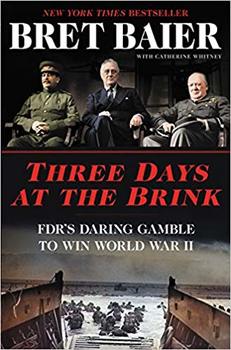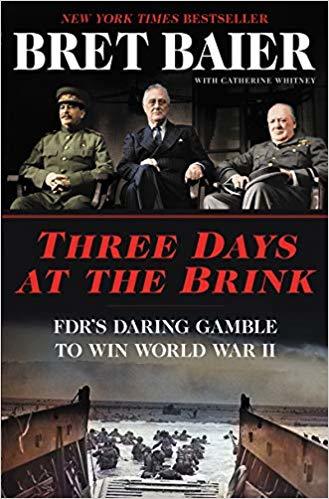
In Three Days at the Brink, journalist Bret Baier and his coauthor purport to zero in on the three-day period late in 1943 when FDR met Winston Churchill and Josef Stalin at the Tehran Conference. The book does include an account of those consequential three days — days “which might have birthed the Cold War [and] were also the turning point in the hot war.” However, the first half of the book is an abbreviated biography of Franklin Roosevelt, and Baier’s account of the Tehran Conference is followed by a lengthy chapter on the early days of the Cold War—as well as an epilogue of sorts that attempts to draw a parallel with Donald Trump’s high-stakes meetings with Kim Jong Un. In other words, the book doesn’t justify its title, and the ending veers far off course.
Estimated reading time: 4 minutes
Was the Tehran Conference the turning point in World War II?
As any student of World War II is fully aware, the three Allied leaders resolved to launch Operation Overlord (the Normandy invasion) at the Tehran Conference (November 28 – December 1, 1943). There, FDR joined Stalin in pressuring Churchill to accede to the invasion and finally got his way. But Baier and Whitney describe the encounter as “FDR’s daring gamble.”
Three Days at the Brink: FDR’s Daring Gamble to Win World War II by Bret Baier and Catherine Whitney (2019) 448 pages ★★★☆☆
The gamble, it turns out, wasn’t the commitment to Overlord. It was FDR’s resolve to cozy up to Stalin at the risk of alienating his close friend, Winston Churchill. “Courting the Soviet leader was high on Roosevelt’s list of priorities,” Baier and Courtney write. “He needed him, even if their closeness hurt Churchill’s pride.” He was gambling that Churchill would ultimately forgive him, and it was a gamble that paid off. Maybe. But such behavior was typical of FDR, who was one of the most gifted manipulators ever to set foot in the Oval Office.
Here’s how the authors set the scene: “After more than four years of fighting, the free world was at the brink. Adolf Hitler’s armies had surged across western Europe and into the Soviet Union and the Mediterranean. The Allies had fought hard, and in the last year they had scored important victories at the edges of Axis-controlled territory: a successful campaign in North Africa; inroads into southern Italy, where Benito Mussolini’s government had collapsed; and a brutal victory in Stalingrad. In the Pacific theater, Allied victories at Midway and Guadalcanal had created positive momentum. But the successes felt piecemeal in the larger scheme of things.”
For the Germans and Japanese, Tehran was not the turning point in World War II
While all this is true, historians and other journalists have made clear that the German general staff and many civilian Nazi leaders were well aware by late 1943 that Germany was losing the war. And even though the fanatical Japanese leadership was oblivious to the obvious, victory in the Pacific was only a matter of time as well. In other words, calling the Tehran Conference the meeting that won the war is a stretch at best.
About the authors
Bret Baier is the chief political anchor for the Fox News Channel and hosts his own show on the network. Three Days at the Brink is the third of his books examining the lives of American Presidents at historical turning points. Previous volumes spotlighted Dwight Eisenhower and Ronald Reagan. Baier describes his coauthor, Catherine Whitney, as “the New York Times bestselling coauthor of more than fifty books.”
For related reading
You might also be interested in:
- 5 top nonfiction books about World War II
- More than 20 good nonfiction books about espionage
- 10 great biographies
- 20 top nonfiction books about history
And you can always find my most popular reviews, and the most recent ones, on the Home Page.



























